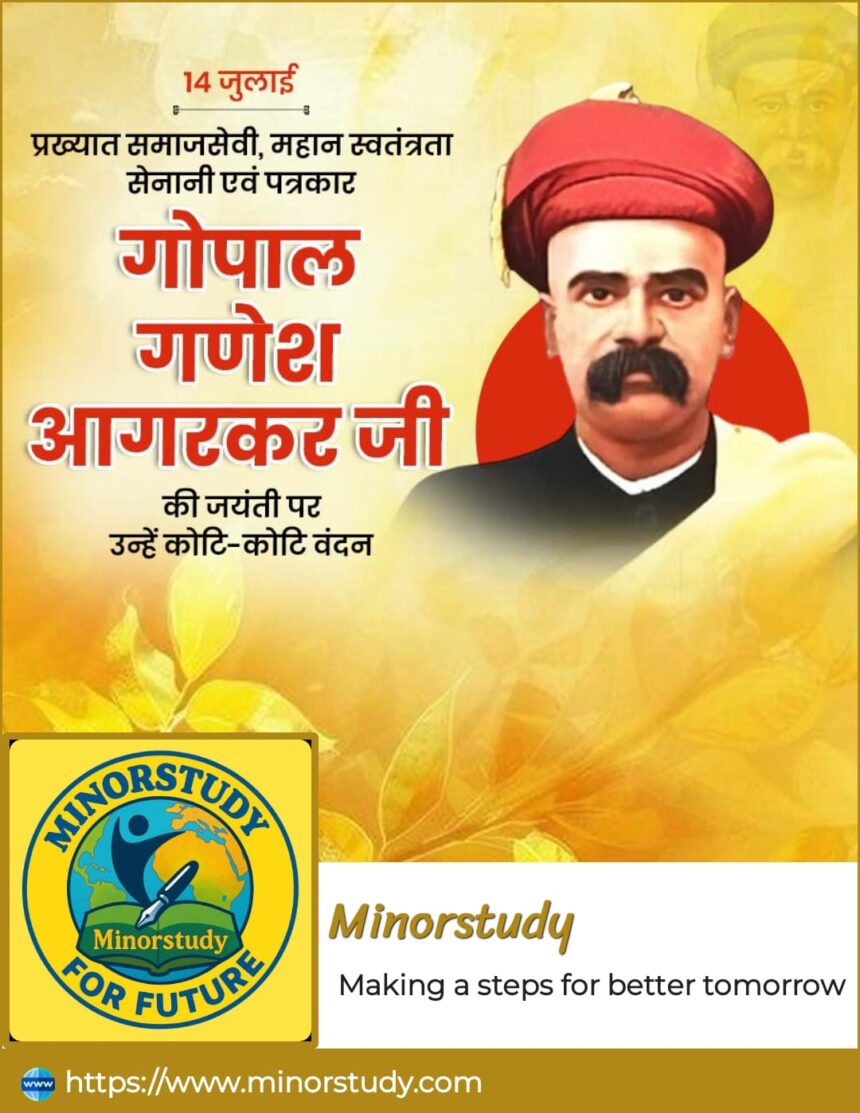🌟 9 Remarkable Reasons Why Gopal Ganesh Agarkar Was a Bold Voice for Social Reform in India
Gopal Ganesh Agarkar: India’s journey to modernity and independence was shaped not just by revolutionaries and political leaders but also by bold social reformers who questioned age-old customs and fought for rational thinking, education, and equality. One such powerful voice was Gopal Ganesh Agarkar – a visionary reformer, journalist, educationist, and freedom thinker.
- 📜 Brief History of Gopal Ganesh Agarkar
- 📌 Important Facts About Gopal Ganesh Agarkar
- 🧭 Timeline – Life Journey of Gopal Ganesh Agarkar
- 🔍 Core Beliefs and Ideological Significance
- 🌟 9 Remarkable Reasons Why Gopal Ganesh Agarkar Was a Pioneer
- 1. 🧠 Champion of Rational Thought
- 2. 📚 Pioneer in Education Reform
- 3. ✍️ Revolutionary Journalist
- 4. 🚫 Opposed Caste-Based Discrimination
- 5. ⚖️ Advocate of Widow Remarriage and Women’s Rights
- 6. 👫 Promoter of Individual Liberty
- 7. ⚔️ Differed from Tilak for the Greater Good
- 8. 🏛️ A Founding Pillar of Indian Modernity
- 9. 🌿 Lived and Died for His Principles
- 💬 FAQs About Gopal Ganesh Agarkar
- 🙏 Observance – How We Remember Him
- 🌼 Birthday Wishes and Tributes
- 💡 Daily Life Lessons from Agarkar’s Legacy
- 📍 Key Takeaways
- 🧠 Conclusion: A Mind Ahead of His Time
While names like Lokmanya Tilak often overshadow his legacy, Agarkar’s contributions were equally vital, especially in the spheres of education, social change, and intellectual awakening.
In this comprehensive article, we pay tribute to his incredible legacy by exploring his history, timeline, facts, FAQs, significance, observance, daily life impact, and importance in society, all in a warm, human-centric tone that reflects the respect he deserves.
📜 Brief History of Gopal Ganesh Agarkar
Gopal Ganesh Agarkar was born on 14 July 1856 in Tembhu village, in the Satara district of present-day Maharashtra. He belonged to a middle-class Chitpavan Brahmin family. Despite limited resources, he pursued education passionately and graduated from Deccan College in Pune, eventually becoming a prominent social reformer, rationalist, and co-founder of the Deccan Education Society.
While he initially worked alongside Bal Gangadhar Tilak and others, his views on social reform and rationalism eventually diverged, leading to a more independent path rooted in liberal and reformist ideals.
📌 Important Facts About Gopal Ganesh Agarkar
🎓 Born: 14 July 1856
🏡 Birthplace: Tembhu, Satara district, Maharashtra
📚 Education: Deccan College, Pune (Graduated with distinction in 1878)
📰 Journalist: First editor of Kesari (1881), later founded Sudharak
🏫 Educationist: Co-founder of New English School, Deccan Education Society, and Fergusson College
🧠 Ideology: Rationalism, liberal thought, social reform
⚰️ Death: 17 June 1895, at the young age of 39
🧭 Timeline – Life Journey of Gopal Ganesh Agarkar
| Year | Event |
|---|---|
| 1856 | Born in Tembhu, Maharashtra |
| 1878 | Graduated from Deccan College |
| 1880 | Co-founded the New English School with Tilak, Apte, and others |
| 1881 | Became the first editor of Kesari newspaper |
| 1883 | Founded his own journal, Sudharak, after parting ways with Tilak |
| 1885 | Became the Principal of Fergusson College |
| 1895 | Passed away on 17 June at age 39 |
🔍 Core Beliefs and Ideological Significance
Agarkar’s life was a testament to free thinking and social courage. His ideas often challenged orthodox practices, even when it meant losing friendships or public favor.
His Core Principles:
Rationalism over Ritualism
Equality over Caste Privilege
Education for All
Social Reforms as Priority over mere political freedom
Freedom of Thought and Expression
He often argued that true independence can only be achieved when society is educated, liberated, and inclusive.
🌟 9 Remarkable Reasons Why Gopal Ganesh Agarkar Was a Pioneer
1. 🧠 Champion of Rational Thought
Agarkar believed that logic and evidence should guide society, not blind tradition. He urged people to question superstitions and social injustices.
2. 📚 Pioneer in Education Reform
He was a founder of several institutions including Fergusson College, which is still one of India’s top colleges. He believed education was the only path to empowerment.
3. ✍️ Revolutionary Journalist
As the first editor of Kesari, and later the founder of Sudharak, Agarkar used journalism to question societal ills, pushing for abolition of untouchability and women’s upliftment.
4. 🚫 Opposed Caste-Based Discrimination
He openly criticized the caste system and was vocal about the need to treat all humans equally, regardless of birth or class.
5. ⚖️ Advocate of Widow Remarriage and Women’s Rights
At a time when talking about widow remarriage was taboo, Agarkar strongly advocated for reform in marriage customs, including education for women.
6. 👫 Promoter of Individual Liberty
He believed that each individual should be free to think, act, and decide—a very modern outlook for his time.
7. ⚔️ Differed from Tilak for the Greater Good
Although once close allies, Agarkar parted ways with Bal Gangadhar Tilak due to ideological differences. He believed social reform must precede political independence.
8. 🏛️ A Founding Pillar of Indian Modernity
His influence shaped modern Indian education, journalism, and reformist discourse. Institutions he helped create still stand tall.
9. 🌿 Lived and Died for His Principles
He lived modestly, worked relentlessly, and died young—but left behind a legacy that continues to educate and inspire.
💬 FAQs About Gopal Ganesh Agarkar
Q1: Was Gopal Ganesh Agarkar a freedom fighter?
A: While he wasn’t involved directly in armed struggle, he was a revolutionary in thought, laying the foundation for modern, rational Indian society.
Q2: What was the reason for his split with Tilak?
A: Agarkar believed social reform was more urgent, while Tilak prioritized political freedom first. Their differing priorities led to an ideological split.
Q3: What is Sudharak?
A: Sudharak was a journal founded by Agarkar in 1883 to promote social reform and rational thought.
Q4: What were his contributions to education?
A: He co-founded New English School, Deccan Education Society, and Fergusson College.
Q5: Why is he less known today?
A: His early death, modesty, and being overshadowed by louder nationalistic voices have led to his relative under-recognition in history books.
🙏 Observance – How We Remember Him
Though his birth and death anniversaries aren’t widely observed nationally, intellectual circles, historians, educational institutes, and rationalist organizations celebrate his contributions by:
Organizing lectures and seminars
Publishing books and articles
Commemorating his work in colleges
Social media tributes using hashtags like #AgarkarJayanti
🌼 Birthday Wishes and Tributes
Here are some heartfelt wishes and messages to honor his birth anniversary:
🕯️ “Remembering Gopal Ganesh Agarkar ji – the fearless reformer who gave us the courage to think freely and speak boldly.”
📘 “Tribute to one of India’s greatest reformers. Thank you, Agarkar ji, for showing us that education and equality are true paths to freedom.”
🌟 “Let us honour the legacy of Gopal Ganesh Agarkar ji by pledging to question, learn, and reform our society continuously.”
💡 Daily Life Lessons from Agarkar’s Legacy
Even today, his ideals can guide us:
| Life Area | Lesson from Agarkar |
|---|---|
| Education | Knowledge is empowerment |
| Equality | Caste and class should never divide |
| Women’s Rights | A progressive society uplifts its women |
| Critical Thinking | Don’t accept traditions blindly |
| Courage | Speak truth even if you stand alone |
📍 Key Takeaways
Agarkar was a pioneer of rationalism and social reform in India.
He emphasized education, equality, and individual freedom.
He believed social reform was the foundation for political freedom.
Institutions he founded still impact lives today.
His courage to part from popular opinion inspired independent thought.
🧠 Conclusion: A Mind Ahead of His Time
Gopal Ganesh Agarkar life reminds us that true freedom starts in the mind. At a time when people were bound by superstition and rigid customs, he chose logic. While others chased political power, he empowered minds.
In today’s world, where information is everywhere but understanding is rare, Agarkar’s vision is more relevant than ever. Let us remember him not just on his anniversary but every time we read, learn, teach, or question.
🕊️ He may not have held flags or led protests—but he gave India something even greater: the courage to think.
#GopalGaneshAgarkar #AgarkarJayanti #RationalistHero #IndianSocialReformers #LegacyOfLogic #EducationForChange #VoiceOfReason









Rattling informative and superb body structure of written content, now that’s user pleasant (:.